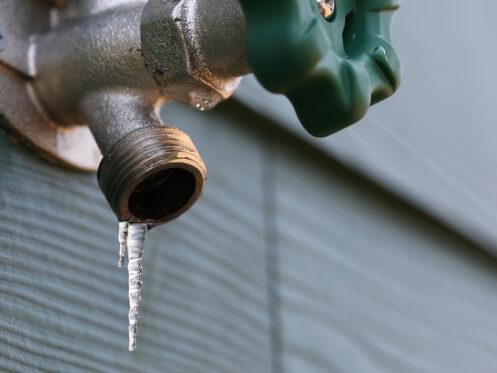Frozen pipes can be a homeowner’s worst nightmare. When temperatures drop, water inside the pipes can freeze, and this will cause them to stiffen and sometimes crack under pressure. Frozen water expands and will stress the pipes until they burst. Once they do, homeowners are left with soaked walls, ceilings, and floors—along with a huge repair bill. Even a small burst can flood homes and cause long-term structural damage.
According to the Insurance Information Institute, 25% of homeowner insurance claims fall under “Water Damage and Freezing.” The good news is that you can prevent this from happening with some preparation. Here are 12 practical steps you can take to keep your pipes from freezing that will enable you to save yourself from the headache of burst pipes this winter.
1. Insulate Exposed Pipes
Exposed pipes are the most at risk for freezing, especially those in cold areas like basements, attics, or garages. Wrapping them in foam or fiberglass insulation is a simple yet effective way to keep them warm. Insulating your water heater can help too because this will make sure it doesn’t overwork during the colder months. By insulating your pipes and water heater, you reduce the risk of freezing and expensive repairs.
2. Maintain Consistent Indoor Temperatures
Turning down your thermostat might seem like a great way to save on heating, but if your pipes freeze, you’ll pay much more in repairs. Keeping your home at a steady temperature of at least 55°F will keep pipes warm enough to prevent freezing. Using a programmable thermostat can help you balance comfort and cost because this sort of technology will make sure your home stays warm while avoiding fluctuating temperatures.
3. Disconnect Garden Hoses and Drain Outdoor Faucets
Outdoor faucets and hoses are easy places for ice to form. Always disconnect garden hoses before winter, drain the remaining water, and store them somewhere dry. Also, turn off the water supply to your outdoor spigots and let any excess water drain. This prevents freezing water from entering your pipes and causing major damage.
4. Seal Any Air Leaks and Check for Drafts
Cold air can sneak into your home through small cracks or gaps, especially near windows, doors, and where pipes enter or exit your house. Take the time to seal these leaks. Adding caulk around windows, reinforcing door seals, and even filling small gaps with spray foam will help keep cold air out and warm air in. Sealing drafts keeps your home warmer and your pipes safer.
5. Open Indoor Cabinets
Pipes hidden behind closed cabinet doors don’t get as much warmth from your heating system. On particularly cold nights, keep the cabinet doors under your sinks open to let warm air circulate. This small step helps prevent pipes in those areas from freezing and bursting.
6. Let Faucets Drip During the Coldest Nights
A slow drip from your faucets during freezing temperatures can be a lifesaver for your pipes. Moving water is less likely to freeze, so by letting the faucet drip, you reduce the chance of water getting stuck, expanding, and damaging your pipes. Just make sure it’s a slow, steady drip, and check both hot and cold lines.
7. Secure Loose Pipes
If you hear your pipes knocking or clanging, don’t ignore it. Loose pipes are prone to bursting, especially when water freezes and expands inside. Ask a plumber to inspect and secure any loose pipes, particularly in colder areas of your home. Securing these pipes early can prevent costly repairs later.
8. Regulate Water Pressure
High water pressure can cause strain on your pipes, especially in the winter when freezing is a concern. Water that’s under too much pressure is more likely to burst through weakened or frozen areas of a pipe. To avoid this, ask a plumber to check your water pressure, which should ideally be between 45-60 PSI, according to the Environmental Protection Agency (EPA). Maintaining proper pressure keeps your pipes safe and efficient.
9. Consider Installing Pipe Heat Cables or Heating Tape
In colder areas, or if your home is prone to freezing pipes, consider adding heat cables or heating tape to the most vulnerable pipes. These tools are thermostat-controlled and activate when the temperature drops too low. They’re a great option for crawlspaces, basements, or exterior walls where pipes are most exposed. However, if you choose to use this insulation method, you should work with a professional. Heat tape can be dangerous if you apply it incorrectly, and hazards can occur, such as fires. Even if you watch all the best DIY videos on the Internet, you will never possess the experience of a trained technician.
10. Replace Corroded Pipes
Old, corroded pipes are more likely to freeze and burst in cold weather. If your pipes are showing signs of wear, such as rusty or discolored water, low water pressure, or foul-tasting water, it’s time to consider replacing them. Corroded pipes weaken over time, and frozen water can easily cause them to crack. A plumber can assess the condition of your pipes and recommend replacements if necessary.
11. Consider Installing Frost-Proof Faucets
Frost-proof faucets are specially designed to prevent freezing in cold weather. These faucets extend into the heated area of your home, and they keep water from freezing at the valve. Installing frost-proof faucets on outdoor spigots or other vulnerable areas can significantly lower the risk of frozen pipes. They’re an easy upgrade that adds extra protection during the winter months. Because there are a variety of options designed to serve specific functions, you can work with a plumber to choose the ones that are best for your circumstances.
12. Schedule Preventative Maintenance
The best way to avoid frozen pipes is through regular maintenance. Scheduling a plumbing check-up in the fall gives you time to address any issues before the cold sets in. A plumber can spot potential problems, such as small leaks or weak spots, and fix them before they become big headaches. This ensures your plumbing system is ready to handle the colder months without any issues.
Preventative maintenance also extends the life of your plumbing system. Whether it’s checking for leaks, insulating pipes, or making sure your water heater is ready for winter, regular care helps avoid costly problems down the road.
Contact Us Today
Frozen pipes can cause considerable damage, but with the right preparation, you can prevent them. At Anderson Heating, Cooling, Plumbing & Electric, we’re here to help you protect your home. Whether you need pipe insulation, faucet repairs, or a full plumbing inspection, our team of licensed plumbers is ready to assist. We serve Mentor, Cleveland, and the surrounding areas with expert plumbing services, including re-piping, leak detection, and water heater maintenance. We can even help you upgrade to an energy-efficient tankless water heater or install frost-proof faucets to keep your home safe during the coldest months. Contact Anderson Heating, Cooling, Plumbing & Electric today for all your plumbing needs and enjoy peace of mind this winter.


